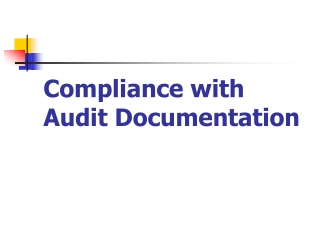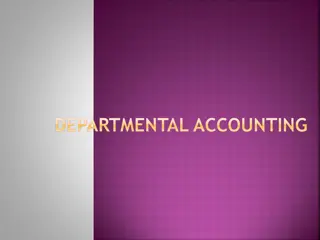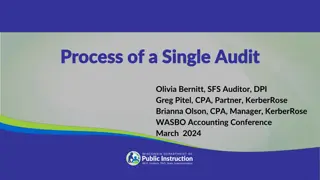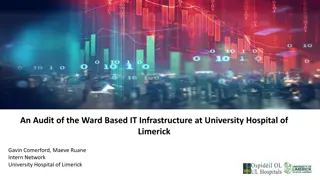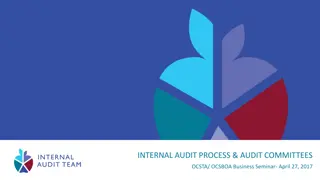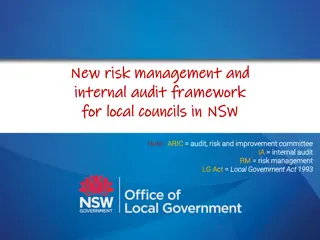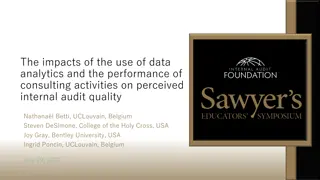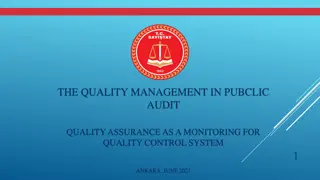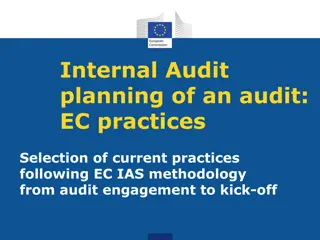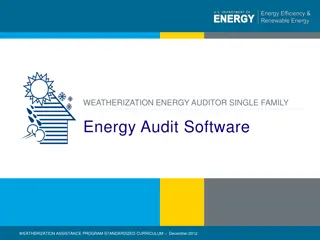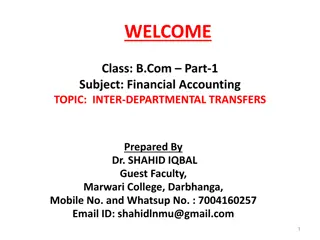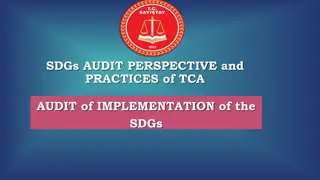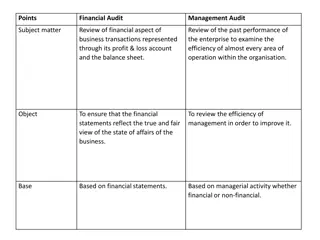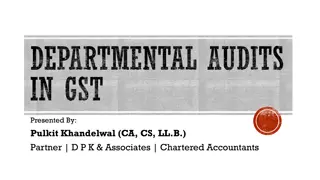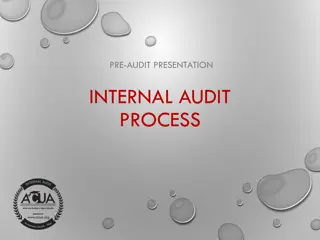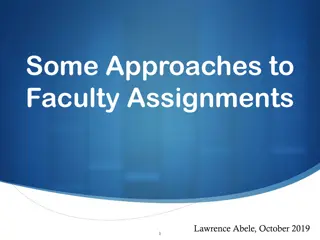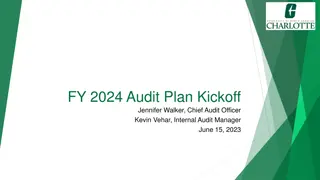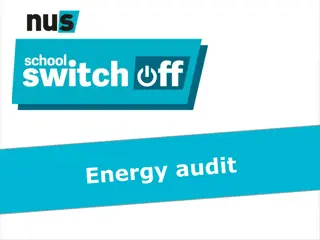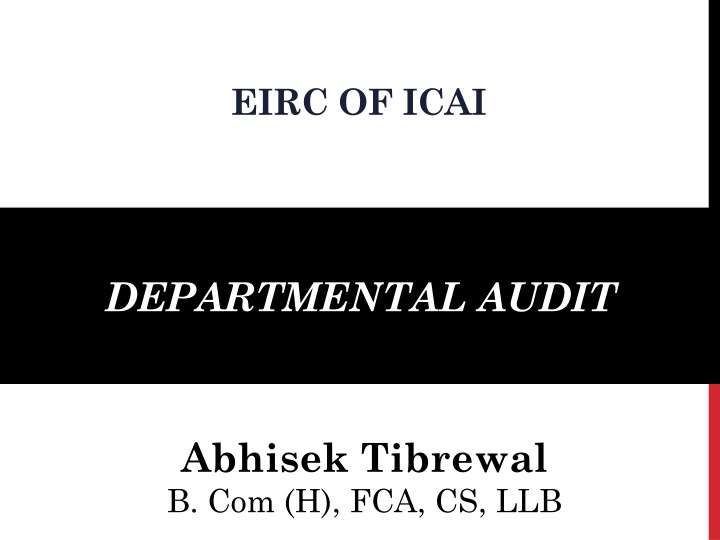
ICAI Departmental Audit Regulations
"Learn about the definition of audit, audit procedures by tax authorities, and regulations for conducting audits under the ICAI Departmental Audit. Get insights into the period, frequency, and completion timelines for audits as per Rule 101 and Section 65. Understand the audit notification process and compliance requirements for registered persons."
Download Presentation

Please find below an Image/Link to download the presentation.
The content on the website is provided AS IS for your information and personal use only. It may not be sold, licensed, or shared on other websites without obtaining consent from the author. If you encounter any issues during the download, it is possible that the publisher has removed the file from their server.
You are allowed to download the files provided on this website for personal or commercial use, subject to the condition that they are used lawfully. All files are the property of their respective owners.
The content on the website is provided AS IS for your information and personal use only. It may not be sold, licensed, or shared on other websites without obtaining consent from the author.
E N D
Presentation Transcript
EIRC OF ICAI DEPARTMENTAL AUDIT Abhisek Tibrewal B. Com (H), FCA, CS, LLB
SECTION 2. DEFINITION OF AUDIT 2(13) "audit" means the examination of records, returns and other documents maintained or furnished by the registered person under this Act or the rules made thereunder or under any other law for the time being in force to verify the correctness of turnover declared, taxes paid, refund claimed and input tax credit availed, and to assess his compliance with the provisions of this Act or the rules made thereunder
SECTION 65. AUDIT BY TAX AUTHORITIES. (1) The Commissioner or any officer authorised by him, by way of a general or a specific order, may undertake audit of any registered person for such period, at such frequency and in such manner as may be prescribed.
RULE 101. AUDIT. (1) The period of audit to be conducted under sub-section (1) of section 65 shall be a financial year or part thereof or multiples thereof.
SECTION 65. AUDIT BY TAX AUTHORITIES. (2) The officers referred to in sub-section (1) may conduct audit at - the place of business of the registered person or - in their office.
SECTION 65. AUDIT BY TAX AUTHORITIES. (3) The registered person shall be informed by way of a notice not less than fifteen working days prior to the conduct of audit in such manner as may be prescribed.
RULE 101. AUDIT. (2) Where it is decided to undertake the audit of a registered person in accordance with the provisions of section 65, the proper officer shall issue a notice in FORM GST ADT-01 in accordance with the provisions of sub-section (3) of the said section.
SECTION 65. AUDIT BY TAX AUTHORITIES. (4) The audit under sub-section (1) shall be completed within a period of three months from the date of commencement of the audit: Provided that where the Commissioner is satisfied that audit in respect of such registered person cannot be completed within three months, he may, for the reasons to be recorded in writing, extend the period by a further period not exceeding six months.
SECTION 65. AUDIT BY TAX AUTHORITIES. Explanation.- For the purposes of this sub-section, the expression "commencement of audit" shall mean - the date on which the records and other documents, called for by the tax authorities, are made available by the registered person or - the actual institution of audit at the place of business, whichever is later.
SECTION 65. AUDIT BY TAX AUTHORITIES. (5) During the course of audit, the authorised officer may require the registered person, - (i) to afford him the necessary facility to verify the books of account or other documents as he may require; (ii) to furnish such information as he may require and render assistance for timely completion of the audit.
RULE 101. AUDIT. (3) The proper officer authorised to conduct audit of the records and the books of account of the registered person shall, with the assistance of the team of officers and officials accompanying him, verify the documents on the basis of which the books of account are maintained and the returns and statements furnished under the provisions of the Act and the rules made thereunder, the correctness of the turnover, exemptions and deductions claimed, the rate of tax applied in respect of the supply of goods or services or both, the input tax credit availed and utilised, refund claimed, and other relevant issues and record the observations in his audit notes.
RULE 101. AUDIT. (4) The proper officer may inform the registered person of the discrepancies noticed, if any, as observed in the audit and the said person may file his reply and the proper officer shall finalise the findings of the audit after due consideration of the reply furnished.
SECTION 65. AUDIT BY TAX AUTHORITIES. (6) On conclusion of audit, the proper officer shall, within thirty days, inform the registered person, whose records are audited, about the findings, his rights and obligations and the reasons for such findings.
RULE 101. AUDIT. (5) On conclusion of the audit, the proper officer shall inform the findings of audit to the registered person in accordance with the provisions of sub-section (6) of section 65 in FORM GST ADT-02.
SECTION 65. AUDIT BY TAX AUTHORITIES. (7) Where the audit conducted under sub-section (1) results in detection of tax not paid or short paid or erroneously refunded, or input tax credit wrongly availed or utilised, the proper officer may initiate action under section 73 or section 74.
SECTION 73 73(1) Where it appears to the proper officer that any tax has not been paid or short paid or erroneously refunded, or where input tax credit has been wrongly availed or utilized for any reason, other than the reason of fraud or any wilful-misstatement or suppression of facts to evade tax, he shall serve notice on the person chargeable with tax which has not been so paid or which has been so short paid or to whom the refund has erroneously been made, or who has wrongly availed or utilised input tax credit, requiring him to show cause as to why he should not pay the amount specified in the notice along with interest payable thereon under section 50 and a penalty leviable under the provisions of this Act or the rules made thereunder.
SECTION 73 73(2) The proper officer shall issue the notice under sub-section (1) at least three months prior to the time limit specified in sub-section (10) for issuance of order. 73(10) The proper officer shall issue the order under sub-section (9) within three years from the due date for furnishing of annual return for the financial year to which the tax not paid or short paid or input tax credit wrongly availed or utilised relates to or within three years from the date of erroneous refund.
EXTENSION OF PERIOD OF LIMITATIONS N/N. 13/2022 CT DATED 05/07/2022 The time limit specified under section 73(10) for issuance of order under section 73(9) of the said Act, for recovery of tax not paid or short paid or of input tax credit wrongly availed or utilized, in respect of a tax period is further extended as under vide N/N. 9/2023 Central Tax dt 31-03-2023. Particulars Original Due Date 31-12-2018 Extended Due Date 07-02-2020 Further Extended - GSTR 9: (FY 2017-18) S. 73 (10): Order u/s 73(9) (FY 2017-18) S. 73 (2): SCN u/s 73(1) (FY 2017-18) S. 73 (10): Order u/s 73(9) (FY 2018-19) S. 73 (10): Order u/s 73(9) (FY 2019-20) 31-12-2021 07-02-2023 31-12-2023 30-09-2021 07-11-2022 30-09-2023 31-12-2022 31-12-2023 30-04-2024 31-12-2023 30-06-2024 30-06-2024
EXTENSION OF PERIOD OF LIMITATIONS N/N. 13/2022 CT DATED 05/07/2022 The period from the 1st day of March, 2020 to the 28th day of February, 2022 shall be excluded for computation of period of limitation specified under section 73(10) for issuance of order under section 73(9) of the said Act, for recovery of erroneous refund. Original Due Date Extended Due Date Particulars Date of Erroneous Refund Date of Refund - S. 73(10): 3 years from Date of Refund 5 years from the date of Refund Order u/s 73(9) for recovery of Erroneous Refund S. 73(2): SCN u/s 73(1) 3 months prior to date of Order 3 months prior to date of Order
EXTENSION OF PERIOD OF LIMITATIONS N/N. 13/2022 CT DATED 05/07/2022 The period from the 1st day of March, 2020 to the 28th day of February, 2022 shall be excluded for computation of period of limitation specified for filing refund application under section 54 or section 55 of the said Act. Original Extended Particulars Due Date Due Date 2 years from 4 years from Due date of Filing of Refund relevant date relevant date
SECTION 73 73(3) Where a notice has been issued for any period under sub-section (1), the proper officer may serve a statement, containing the details of tax not paid or short paid or erroneously refunded or input tax credit wrongly availed or utilised for such periods other than those covered under sub-section (1), on the person chargeable with tax. 73(4) The service of such statement shall be deemed to be service of notice on such person under sub-section (1), subject to the condition that the grounds relied upon for such tax periods other than those covered under sub-section (1) are the same as are mentioned in the earlier notice.
SECTION 73 73(5) The person chargeable with taxmay, before service of notice under subsection (1) or, as the case may be, the statement under sub-section (3), pay the amount of tax along with interest payable thereon under section 50 on the basis of his own ascertainment of such tax or the tax as ascertained by the proper officer and inform the proper officer in writing of such payment. 73(6) The proper officer, on receipt of such information, shall not serve any notice under sub-section (1) or, as the case may be, the statement under sub-section (3), in respect of the tax so paid or any penalty payable under the provisions of this Act or the rules made thereunder.
SECTION 73 73(7) Where the proper officer is of the opinion that the amount paid under sub-section (5) falls short of the amount actually payable, he shall proceed to issue the notice as provided for in sub-section (1) in respect of such amount which falls short of the amount actually payable. 73(8) Where any person chargeable with tax under sub-section (1) or sub- section (3) pays the said tax along with interest payable under section 50 within thirty days of issue of show cause notice, no penalty shall be payable and all proceedings in respect of the said notice shall be deemed to be concluded.
SECTION 73 73(9) The proper officer shall, after considering the representation, if any, made by person chargeable with tax, determine the amount of tax, interest and a penalty equivalent to ten per cent. of tax or ten thousand rupees, whichever is higher, due from such person and issue an order. 73(10)The proper officer shall issue the order under sub-section (9) within three years from the due date for furnishing of annual return for the financial year to which the tax not paid or short paid or input tax credit wrongly availed or utilised relates to or within three years from the date of erroneous refund.
SECTION 73 73(11) Notwithstanding anything contained in sub-section (6) or sub- section (8), penalty under sub-section (9) shall be payable where any amount of self-assessed tax or any amount collected as tax has not been paid within a period of thirty days from the due date of payment of such tax.
CIRCULAR NO. 76/50/2018-GST Whether penalty in accordance with section 73 (11) of the CGST Act should be levied in cases where the return in FORM GSTR-3B has been filed after the due date of filing such return? 1. As per the provisions of section 73(11) of the CGST Act, penalty is payable in case self-assessed tax or any amount collected as tax has not been paid within a period of thirty days from the due date of payment of such tax. 2. It may be noted that a show cause notice (SCN) is required to be issued to a person where it appears to the proper officer that any tax has not been paid or short paid or erroneously refunded or where input tax credit has been wrongly availed or utilised for any reason under the provisions of section 73(1) of the CGST Act. The provisions of section 73(11) of the CGST Act can be invoked only when the provisions of section 73 are invoked.
CIRCULAR NO. 76/50/2018-GST 3. The provisions of section 73 of the CGST Act are generally not invoked in case of delayed filing of the return in FORM GSTR-3B because tax along with applicable interest has already been paid but after the due date for payment of such tax. It is accordingly clarified that penalty under the provisions of section 73(11) of the CGST Act is not payable in such cases. It is further clarified that since the tax has been paid late in contravention of the provisions of the CGST Act, a general penalty under section 125 of the CGST Act may be imposed after following the due process of law.
SECTION 74 74(1) Where it appears to the proper officer that any tax has not been paid or short paid or erroneously refunded or where input tax credit has been wrongly availed or utilized by reason of fraud, or any wilful-misstatement or suppression of facts to evade tax, he shall serve notice on the person chargeable with tax which has not been so paid or which has been so short paid or to whom the refund has erroneously been made, or who has wrongly availed or utilised input tax credit, requiring him to show cause as to why he should not pay the amount specified in the notice along with interest payable thereon under section 50 and a penalty equivalent to the tax specified in the notice.
SECTION 74 74(2) The proper officer shall issue the notice under sub-section (1) at least six months prior to the time limit specified in sub-section (10) for issuance of order. 74(10) The proper officer shall issue the order under sub-section (9) within a period of five years from the due date for furnishing of annual return for the financial year to which the tax not paid or short paid or input tax credit wrongly availed or utilised relates to or within five years from the date of erroneous refund.
SECTION 74 74(3) Where a notice has been issued for any period under sub-section (1), the proper officer may serve a statement, containing the details of tax not paid or short paid or erroneously refunded or input tax credit wrongly availed or utilised for such periods other than those covered under sub-section (1), on the person chargeable with tax. 74(4) The service of statement under sub-section (3) shall be deemed to be service of notice under sub-section (1) of section 73, subject to the condition that the grounds relied upon in the said statement, except the ground of fraud, or any wilful-misstatement or suppression of facts to evade tax, for periods other than those covered under subsection (1) are the same as are mentioned in the earlier notice.
SECTION 74 74(5) The person chargeable with tax may, before service of notice under sub-section (1), pay the amount of tax along with interest payable under section 50 and a penalty equivalent to fifteen per cent. of such tax on the basis of his own ascertainment of such tax or the tax as ascertained by the proper officer and inform the proper officer in writing of such payment. 74(6) The proper officer, on receipt of such information, shall not serve any notice under sub-section (1), in respect of the tax so paid or any penalty payable under the provisions of this Act or the rules made thereunder.
SECTION 74 74(7) Where the proper officer is of the opinion that the amount paid under sub-section (5) falls short of the amount actually payable, he shall proceed to issue the notice as provided for in sub-section (1) in respect of such amount which falls short of the amount actually payable. 74(8) Where any person chargeable with tax under sub-section (1) pays the said tax along with interest payable under section 50 and a penalty equivalent to twenty-five per cent. of such tax within thirty days of issue of the notice, all proceedings in respect of the said notice shall be deemed to be concluded.
SECTION 74 74(9) The proper officer shall, after considering the representation, if any, made by the person chargeable with tax, determine the amount of tax, interest and penalty due from such person and issue an order. 74(10) The proper officer shall issue the order under sub-section (9) within a period of five years from the due date for furnishing of annual return for the financial year to which the tax not paid or short paid or input tax credit wrongly availed or utilised relates to or within five years from the date of erroneous refund.
SECTION 74 74(11) Where any person served with an order issued under sub-section (9) pays the tax along with interest payable thereon under section 50 and a penalty equivalent to fifty per cent. of such tax within thirty days of communication of the order, all proceedings in respect of the said notice shall be deemed to be concluded.
EXPLANATION TO SECTION 73 & 74 Explanation 1. For the purposes of section 73 and this section, (i) the expression all proceedings in respect of the said notice shall not include proceedings under section 132; (ii) where the notice under the same proceedings is issued to the main person liable to pay tax and some other persons, and such proceedings against the main person have been concluded under section 73 or section 74, the proceedings against all the persons liable to pay penalty under sections 122, 125, 129 and 130 are deemed to be concluded.
EXPLANATION TO SECTION 73 & 74 Explanation 2. For the purposes of this Act, the expression suppression shall mean non-declaration of facts or information which a taxable person is required to declare in the return, statement, report or any other document furnished under this Act or the rules made thereunder, or failure to furnish any information on being asked for, in writing, by the proper officer.
SUPPRESSION??? SIMPLEX INFRASTRUCTURES LTD. V/S COMMISSIONER OF S.T., KOLKATA 2016 (42) S.T.R. 634 (Cal.) Suppression of fact in the context of this case can only mean non-disclosure of correct information deliberately to evade payment of service tax. There must be an element of fraud and dishonest motive before a non-disclosure simplicitor can be called suppression of facts . In the present case, the petitioner suppressed nothing and maintained all throughout that it did not carry on business as consulting engineer and as such was not liable to pay service tax under that head. Even if such perception of the petitioner was founded to be erroneous subsequently still the same would not, in my mind, amount to suppression of fact. Unless a party deliberately conceals material facts with a dishonest motive of eroding some liability or making some unlawful gain, he cannot be said to be guilty of suppression of facts.
SUPPRESSION??? SOURAV GANGULY Versus UNION OF INDIA [2016 (43) S.T.R. 482 (Cal.)] I am of the opinion that a mechanical reproduction of the language of the proviso to Sec. 73(1) of the Finance Act, 1994 would not per se justify invocation of the extended period of limitation. A mere bald assertion that the assessee wilfully suppressed the material facts with intent to evade payment of service tax, is not sufficient. The notice must contain particulars of facts and circumstances in support of such allegation. After all, the allegation of suppression of material facts to evade payment of tax amounts to ascribing a fraudulent motive to the assessee and is a serious allegation.
SUPPRESSION??? Just as in judicial proceeding, when fraud is alleged against a person, such allegation would carry no weight unless particulars of fraud are furnished by the person alleging fraud, in my view, in a quasi-judicial proceeding also when an allegation of fraud or any allegation of similar nature is made against a person, particulars of the same must be furnished. The person against whom fraud is alleged must know with sufficient certainty of the case that he has to answer. A mere ipse dixit that fraud has been committed or something has been done or permitted to be done with fraudulent motive cannot be taken note of and cannot form the basis of any action on the part of the authorities. Even if, such particulars are not included in the notice, the Department should be in a position to justify and/or substantiate its allegation of suppression of material facts on the part of the noticee.
EXTENDED PERIOD OF LIMITATION 1. UOI Vs. Rajasthan Spinning & Weaving Mills reported in 2009 (238) ELT 3 (SC): no element of deception or malpractice, neither extended period of limitation would be invokable nor penalty U/s 11AC would be imposable 2. CCE Vs. Mysore Kirloskar Ltd reported in 2008 (226) E.L.T. 161 (S.C): When adequate reasons for invoking provision to Sec.11A (1) is not indicated in the show Cause Notice and the allegations are vague, extended period of limitation cannot be invoked on the basis of vague allegations 3. Calcutta Industrial Supply Corpn vs. Commissioner of S.T., Kolkata2019 (31) G.S.T.L. 487 (Tri. Kolkata): case involves the classification of service and therefore, extended period of limitation cannot be invoked and the imposition of penalty is not justified.
EXTENDED PERIOD OF LIMITATION 4. CCE Vs. Bajaj Auto Ltd. reported in 2010 (260) ELT 17 (SC): Section 11A is an exception and hence should be strictly constructed and initial burden to prove that situation visualized by provision to Section 11A existed must be discharged by adducing sufficient material to show that assessee is guilty of any of those situation. 5. TRANS ENGINEERS INDIA PVT. LTD Versus COMMISSIONER OF C. EX., PUNE [2015 (40) S.T.R. 490 (Tri. Mumbai)]: Revenue authority cannot invoke the extended period of limitation, when the records of the assessee were audited by the officers once but did not find any short- payment from records. The 2nd audit party, doing the audit of same period or over lapping period, cannot allege that appellant has misstated or suppressed the facts from the departments.
EXTENDED PERIOD OF LIMITATION 6. NIZAM SUGAR FACTORY Versus COLLECTOR OF CENTRAL EXCISE, A.P [2008 (9) S.T.R. 314 (S.C.)] : Allegation of suppression of facts against the appellant cannot be sustained. When the first SCN was issued all the relevant facts were in the knowledge of the authorities. Later on, while issuing the second and third show cause notices the same/similar facts could not be taken as suppression of facts on the part of the assessee as these facts were already in the knowledge of the authorities.
CAN EXTENDED PERIOD OF LIMITATION BE INVOKED AFTER AUDIT?
SECTION 66. SPECIAL AUDIT (1) If at any stage of scrutiny, inquiry, investigation or any other proceedings before him, any officer not below the rank of Assistant Commissioner, having regard to the nature and complexity of the case and the interest of revenue, is of the opinion that the value has not been correctly declared or the credit availed is not within the normal limits, he may, with the prior approval of the Commissioner, direct such registered person by a communication in writing to get his records including books of account examined and audited by a chartered accountant or a cost accountant as may be nominated by the Commissioner. (2) The chartered accountant or cost accountant so nominated shall, within the period of ninety days, submit a report of such audit duly signed and certified by him to the said Assistant Commissioner mentioning therein such other particulars as may be specified: Provided that the Assistant Commissioner may, on an application made to him in this behalf by the registered person or the chartered accountant or cost accountant or for any material and sufficient reason, extend the said period by a further period of ninety days.
SECTION 66. SPECIAL AUDIT (3) The provisions of sub-section (1) shall have effect notwithstanding that the accounts of the registered person have been audited under any other provisions of this Act or any other law for the time being in force. (4) The registered person shall be given an opportunity of being heard in respect of any material gathered on the basis of special audit under sub-section (1) which is proposed to be used in any proceedings against him under this Act or the rules made thereunder. (5) The expenses of the examination and audit of records under sub-section (1), including the remuneration of such chartered accountant or cost accountant, shall be determined and paid by the Commissioner and such determination shall be final. (6) Where the special audit conducted under sub-section (1) results in detection of tax not paid or short paid or erroneously refunded, or input tax credit wrongly availed or utilised, the proper officer may initiate action under section 73 or section 74.
RULE 102. SPECIAL AUDIT. (1) Where special audit is required to be conducted in accordance with the provisions of section 66, the officer referred to in the said section shall issue a direction in FORM GST ADT-03 to the registered person to get his records audited by a chartered accountant or a cost accountant specified in the said direction. (2) On conclusion of the special audit, the registered person shall be informed of the findings of the special audit in FORM GST ADT-04.
Abhisek Tibrewal B. Com (H), FCA, CS, LLB tibrewalca@gmail.com | +91 88204 65822 A. K. Tibrewal & Co. Chartered Accountants Kolkata | Rourkela | Jamshedpur | Bhubaneswar

